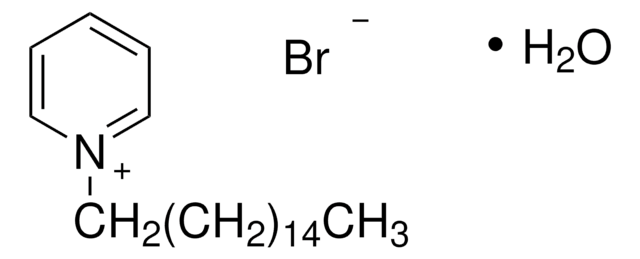52340
Hexadecylpyridinium bromide
≥97.0%
Synonym(s):
Cetylpyridinium bromide
About This Item
Recommended Products
description
cationic
Quality Level
Assay
≥97.0%
mol wt
384.44 g/mol
technique(s)
titration: suitable
SMILES string
[Br-].CCCCCCCCCCCCCCCC[n+]1ccccc1
InChI
1S/C21H38N.BrH/c1-2-3-4-5-6-7-8-9-10-11-12-13-14-16-19-22-20-17-15-18-21-22;/h15,17-18,20-21H,2-14,16,19H2,1H3;1H/q+1;/p-1
InChI key
DVBJBNKEBPCGSY-UHFFFAOYSA-M
Looking for similar products? Visit Product Comparison Guide
General description
Application
- Prepare a polyfluorate salt.
- Inhibit the corrosion of mild steel in acidic media.
Signal Word
Danger
Hazard Statements
Precautionary Statements
Hazard Classifications
Acute Tox. 2 Inhalation - Acute Tox. 4 Oral - Aquatic Acute 1 - Eye Dam. 1 - Skin Irrit. 2 - STOT SE 3
Target Organs
Respiratory system
Storage Class Code
6.1A - Combustible acute toxic Cat. 1 and 2 / very toxic hazardous materials
WGK
WGK 3
Flash Point(F)
Not applicable
Flash Point(C)
Not applicable
Personal Protective Equipment
Regulatory Listings
Regulatory Listings are mainly provided for chemical products. Only limited information can be provided here for non-chemical products. No entry means none of the components are listed. It is the user’s obligation to ensure the safe and legal use of the product.
JAN Code
52340-500G:
52340-VAR:
52340-100G:
52340-BULK:
Choose from one of the most recent versions:
Already Own This Product?
Find documentation for the products that you have recently purchased in the Document Library.
Customers Also Viewed
Our team of scientists has experience in all areas of research including Life Science, Material Science, Chemical Synthesis, Chromatography, Analytical and many others.
Contact Technical Service












